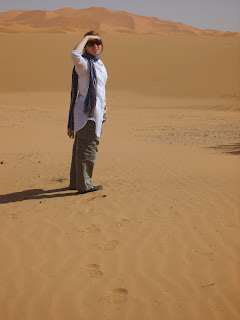Thursday, September 13, 2012
On slow change
Wednesday, September 7, 2011
Promise in Dust
The living air exhales caramel breaths—warm, golden, delicious. Every breeze wafts a new hue across the senses.
Sky blinks cloudless, batting blue eyes. As though straining with the labourers, she flushes deeper pigment—and puddle and slough reflect her cobalt complexion.
Grass exchanges velvet green coats for linen browns, transforming assumed undergrowth into a menagerie of bristle, straw, mulch clump, and dulling emeralds.
And in the evening light, even dust glimmers beauty. Suspended like organza sashes of some grand dancer, it floats and lingers, slivers of milky mist, whiffs of toffee.
Sweeping, inviting, lingering—dust envelopes the pilgrim, calling deeper, pointing beyond; hinting, always hinting, making one look and ponder.
The fields waiting consummation, grain laying dead in bundled rows—silent, still, finished. Soon it will be in bin and truck and terminal, this living death of waiting, till at last it can die again in soil, and truly live. Machines churning in procession, orderly, stoic, pitiless, dutiful; their drivers squinting in receding sun. Saved all year, for these ten days of labour, red and green and yellow they plod; cutting, collecting, shelling, saving the promises in hopper and auger.
Soon, it will pass. Soon, machines will rest in Quonset, seeds will wait in bins, farmers will break for winter blizzards. Next year, we will do it all over again. We will hope, and pray, and wish each other well as we work the land, and the soil works into us.
Colours deepen, then fade. A giant Canada goose points south, stationary, glimmering, then withering into wisp of cloud.
We sigh with the land. We fade with the land. We groan with the land. And we bear fruit, in season, like the land, our lives reflecting and refracting colour from the Light of Life.
And we, with the land, remember, and live promise.
seedtime and harvest,
cold and heat,
winter and summer,
and day and night,
shall not cease.” Genesis 8:22
Wednesday, July 20, 2011
On the other side of the bog
I’d rather blame the instruction manuals, the circumstances, people, and events that shape my days and form my patterns. But externals were never meant to define the inner soul. If they could, we would only need a set of behavioural guidelines and we would be fine.
Textbooks cannot make me love what is good and glory in what is beautiful and treasure what is precious. Only God can do that.
His work starts by strong hints to the heart that there is something better than what I experience, something more, a beauty and glory beyond me.
And His work continues with inklings, urges, signposts telling me “Wrong Way,” all along the winding path of common sense.
Hunger for transcendence, dissatisfaction with terra firma: these two desires play in harmony on the soul, comforting and chaffing, pricking and gnawing, inviting and repulsing . . . all in a single breath.
Without God echo, soul would wither and shrivel in despair and shame. And without stinking wreckage of man’s folly strewn over the footpath, soul would careen to ultimate demise.
Checks and guards, some painful prodding, sometimes yanking away from foolish tributaries . . . this Shepherded journey leads on: a clear trail home carved around faulty, treacherous footpaths.
And in the pain of the rod, the discomfort of staff, the upsetting of foregone conclusions about life and living, one comfort repeats: He is with me.
“Your rod and Your staff comfort me.”
“I will fear no evil, for You are with me.”
“You have hedged me behind and before, and laid Your hand upon me.”
P.S. I wrote this a week ago, but let it simmer and stew a while before posting . . . still smarting from a Divine spanking, bashful at the undoing, healing power of Grace, and just not sure about words in this busyness.
Thursday, May 19, 2011
Pilgrimage
19 May 2011
Sometimes our journeys bring us round again, to vistas familiar. Our vantage new, scenes before us recognized, and the heart remembers what it felt the first time it saw. 
The higher ridge means haze and thin air; soul must rest frequent, and monitor constant to live up here, listening for song in the wind, keeping simple in the extremes.
And the low valley means suspenseful quiet, taut senses; and soul must hush pounding heartbeat to listen for whispers of hope.
One day we wake, and realize our surroundings: makeshift shelters, impossible panoramas, unfamiliar territory. We’re in a caravan, and we forgot. I’m a pilgrim, and I must remember. 
Because the wilderness is wide, wild, brutal. And the oasis can suffocate and mislead. There is no location impervious to danger, because internal hazards outweigh external threats.
Sheer awe, the overwhelmed soul, and despair’s haunting companionship bring us silent, gaping, cognizant of our relative size in this vastness. We are vulnerable. We are small. We are undone.
But we are not alone. I am not alone.
And we will not be utterly forsaken, because God has committed Himself to us, because He chose to, because we belong to Him.
The only good thing about being a sheep in this wilderness, is having a Good Shepherd. Many leaders call for our adherence, but only God is good.
He is God, and I am not.
And He is good, and I am safe.
| What is your only comfort in life and in death?
That I am not my own, But belong body and soul, in life and death, To my faithful Saviour, Jesus Christ.
-Heidelberg Catechism
|

















